
Challenge 2500 | 9. A Leap Forward!
In this blog entry, I'll review the GM tournament in Budapest I competed in late March. Also, an outlook into what's next. Hope you enjoy the read!Intro
I competed in one of the two GM tournaments that took place in Budapest in the March edition of SixDays Chess. Here's the link to chess-results: http://chess-results.com/tnr727427.aspx?lan=1
First of all, this tournament might have been my last for a while, as I'll take an extended break (of roughly 3,5 months) from competitive chess to focus on other things. Playing classical tournaments regularly sadly is an impossibility for non-professionals!
Also, I rarely play these types of tournaments. In fact, this was only my second time participating in a GM tournament (which essentially is a round-robin tournament designed to fulfill all the necessary formal conditions for achieving norms), which means that it was a rare opportunity to play against consistently strong opposition, round after round, something you don't typically have in open tournaments.
Given all that, I really wanted it to go well, which, thankfully, it did!
Again, let's start with the numbers, as always: 6/9 points (3 wins, 6 draws) against a rating average of 2386, which amounts to a rating performance of 2511 and a +12,4 rating gain.
Not an otherworldly performance, but a decent one I am quite happy with! To give some context: to achieve the 2600-performance needed for a GM norm, one would've had to score 7/9.
The games were a lot more exciting and erratic than the score might suggest though! I found myself in many tough spots or even outright lost more than once.
At the same time, I missed a number clear wins myself, so all in all, I think the final score was fair given the games.
Hypothetically, if my opponents had taken advantage of every clearly winning position, I could've ended up with 4,5 points only. On the other hand, if I had taken advantage of every winning position, I could've potentially scored 7,5 points.
In general, the blunder frequency was quite a bit higher than usual (and the overall game quality lower). This was, I'd argue, mainly due to the time control, as there was no additional time added after completing 40 moves (to clarify: in many tournaments, the time control is such that players receive an additional 15-30 minutes after having completed 40 moves).
It's quite remarkable how much of a difference that makes. Many of the games effectively turned into fast-paced rapid games at some point!
Before going through the tournament round by round, here's two photos from Budapest. Sadly, I didn't have much time to explore the city, but it was enough to appreciate some of the beauty of Hungary's capital, split by the Danube into Buda and Pest.

The Hungarian Parliament Building

The Danube by night
The games
(1)
In round 1, I had the white pieces against a 2356-rated player from Hungary and I hoped to start strong with a win.
I tend to play a bit shakily in the first round of a tournament though, so I wanted to play without much risk, which is why I chose a line that resulted in a slightly better endgame.
The game was pretty decent, but at some point I felt like I misplayed the position as I ended up in this rook-endgame, where I thought I had lost all of my advantage:
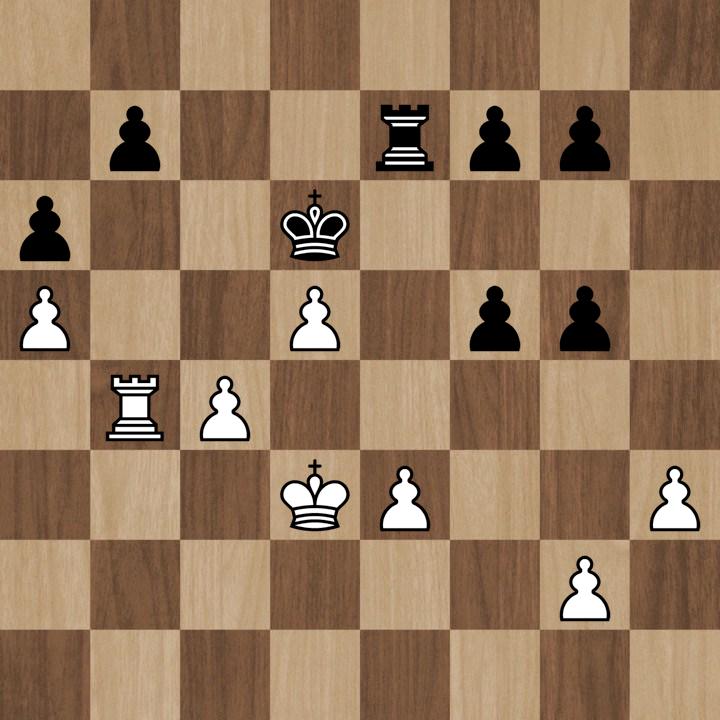
We repeated moves here with 38.Kd4 Re4+ 39.Kd3 Re7 39.Kd4. I felt like I couldn't let the Black king reach c5 without possibly risking being worse.
This turned out to be a massive misevaluation by me. I was a bit shocked when I later found out White is basically winning here! Apparently, 38.Rb6+ Kc5 39.g3! followed by 40.h4 leaves Black in dire straits.
I should note that I had roughly two minutes left at this point, and realising White's potential here is far from trivial, but still, drawing in a winning position does sting.
(2)
Incredibly, the same thing (draw by repetition in a winning position) happened in round 2.
Here however, I still consider myself lucky not to have lost the game.
In the following wild position, (at this point, we both were playing on increment) my opponent (2454) had a clear win:
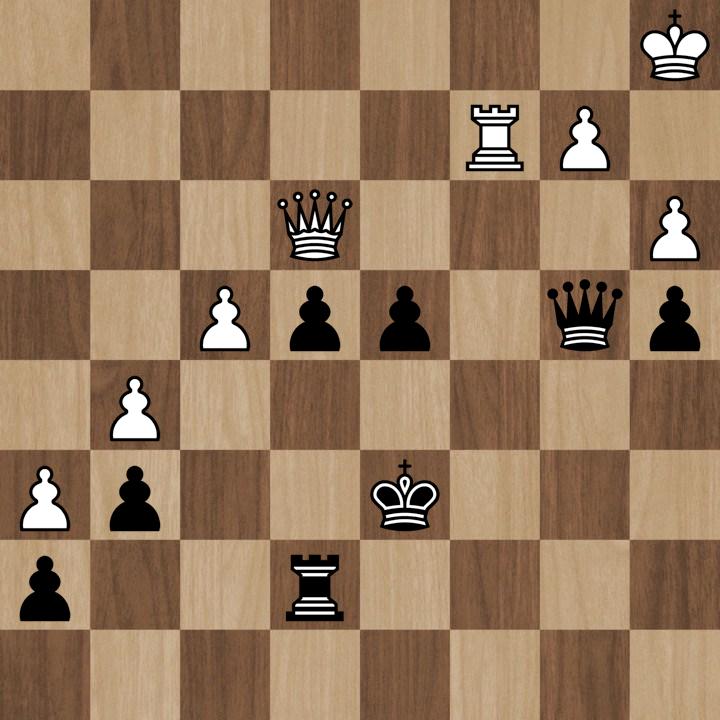
47.Rd2! wins on the spot, as I have to part ways either with my Queen or my d4-pawn, both leading to a hopeless position. Thankfully, my opponent didn't spot this and after 47.Qc1? Qb6 Black is actually fine! (Although, of course, I had absolutely no idea what was going on during the game)
I played well from here and at some point, after some mistakes from my opponent, we reached this position:
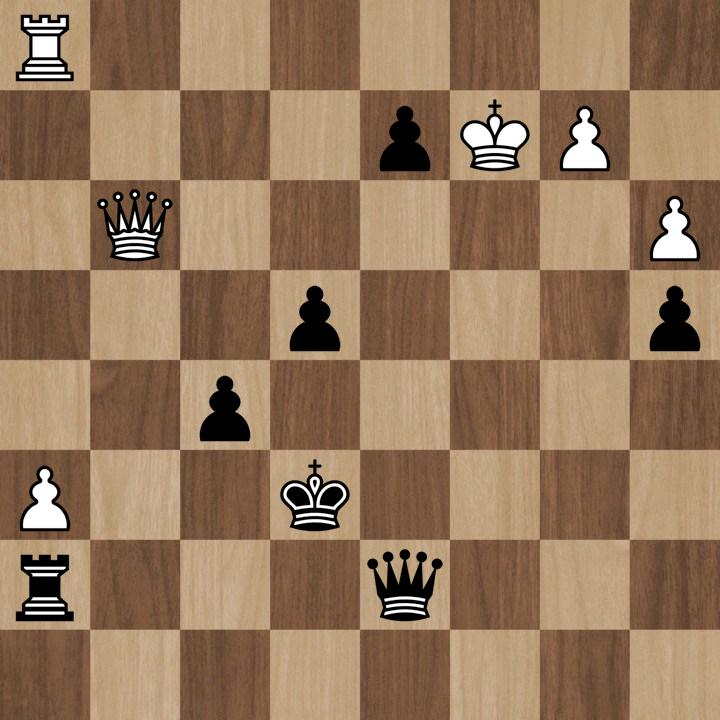
And again, I went for a draw, this time repeating with 57. ...Qc6+ 58.Kb1 Qd7 59.Kc2 etc.
Here, Black even has multiple ways of winning, the most direct one being 57. ...Qc8+ 58.Kb1 Rc7! with ...Rc1+ coming next.
Having put my rook on h7 a couple of moves prior, I wasn't psychologically prepared to consider such lines, especially with a minute on the clock.
This is really supposed an explanation rather than an excuse, since clearly I have to become sharper in these critical situations.
(3)
In round 3 against Arfan (2374), I finally managed to play a clean game, winning my first of the tournament and reaching 2/3 points.
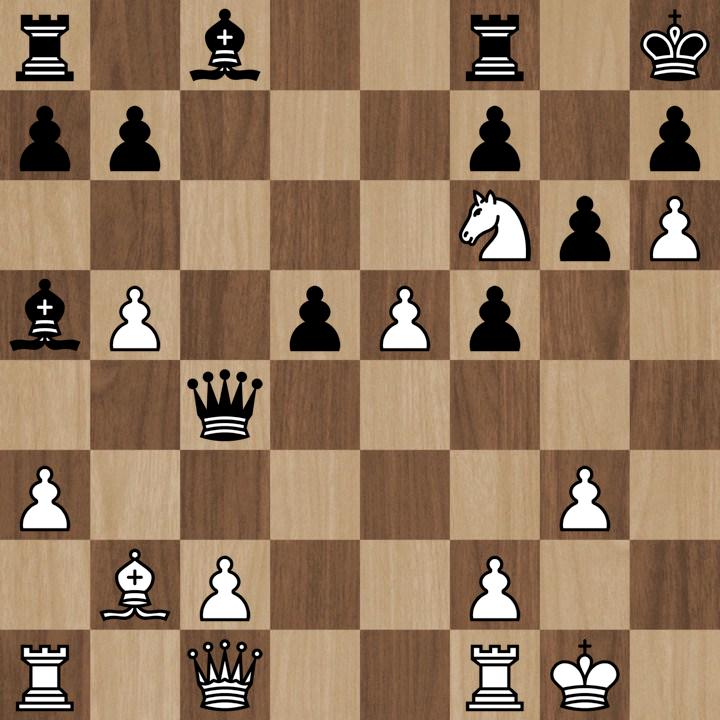
Here, the thematic clearance sacrifice 26.e6! followed by the precise 26. ...Bxe6 27.Qe3! decided the game, as White simply invades on the dark squares, the black king being in a hopeless spot.
(4)
In round 4, I was Black against GM Misa Pap (2403), and I was slightly worse for quite a while. Here though: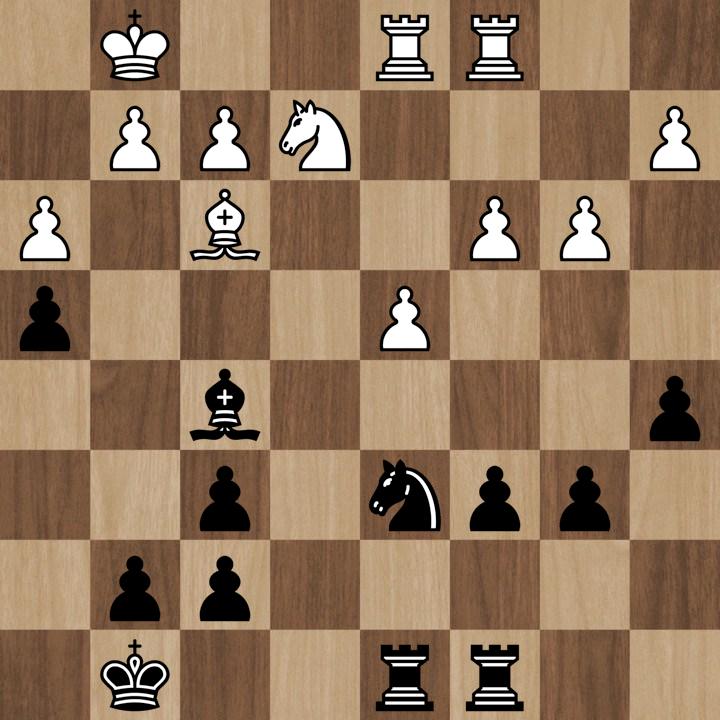
...my opponent made the in my view questionable strategic decision of closing the center with 27.d5?! c5 28.c4, after which I thought Black should be for choice, as White's minor pieces seem not to have any prospect whatsoever, while Black has the classic eternally blockading knight on d6 and a free hand on the kingside.
Later on, I was actually clearly better but in time pressure I couldn't show the level of precision the position demanded, so the game petered out to a draw.
Again, bad time management. I would have loved to have some 20 minutes left as we reached the position shown above, but alas, I had to manage with only 4.
(5)
Round 5 against Horvath (2454) was my wildest game of the tournament. It was truly epic, lasting 149 moves. And we were both below 10 minuts by move 24!
We both missed several winning continuations, the evaluation swinging up and down an embarrassing amount of times, so it feels strange to pick one position as particularly noteworthy.
Instead, here's the whole game as a gif. Bring some patience with you though if you intend to watch the whole thing.
In the end, I had to defend R vs. R+B for 50 moves, which I managed to do without much trouble, thankfully.
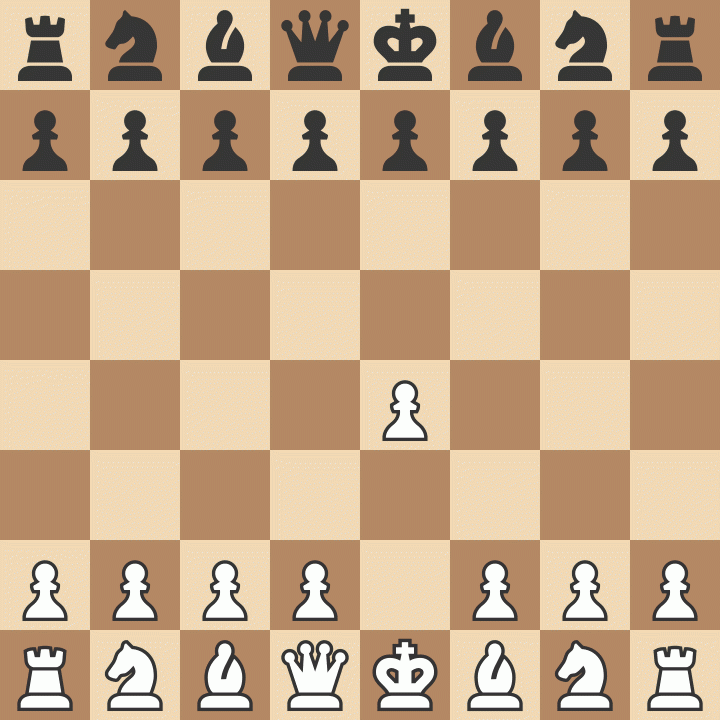
(6)
In round 6, I won my second game of the tournament, this time not very convincingly though, as I made some questionable moves in the position resulting from the opening and ended up in a clearly worse position.
However, my opponent (2396) eventually went for a plan that looked strong, but wasn't actually. I finally equalised and eventually even reached a better endgame, where my opponent prompty made a decisive blunder with 42.Re3??
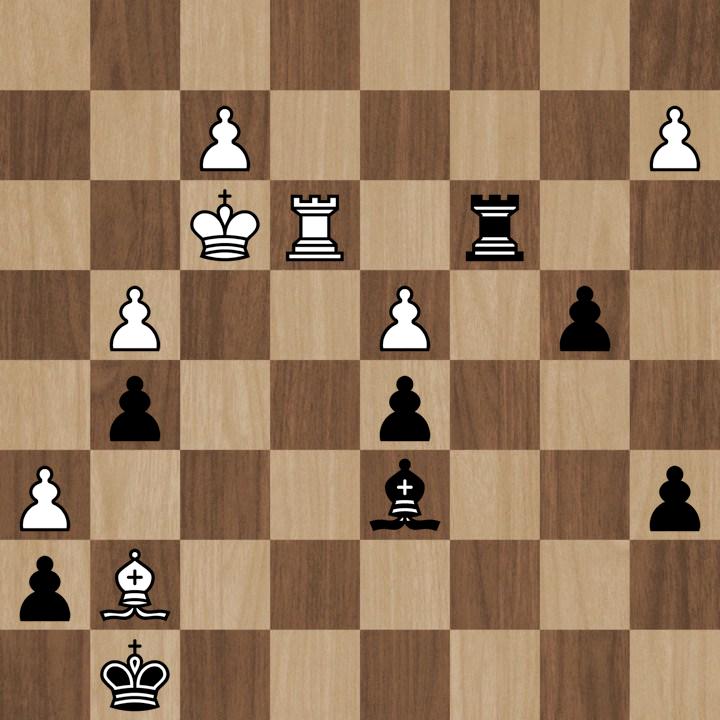
Where 42. ...Bf4! forced resignation.
I was definitely lucky in this game. For much of it I was just trying to hang on, so this win certainly felt like a gift.
(7)
At this point, I was actually still in the running for a GM norm. I had to win my remaining 3 games though to score those 7 points. I probably had a good chance in round 7 to keep those hopes alive in the following position:
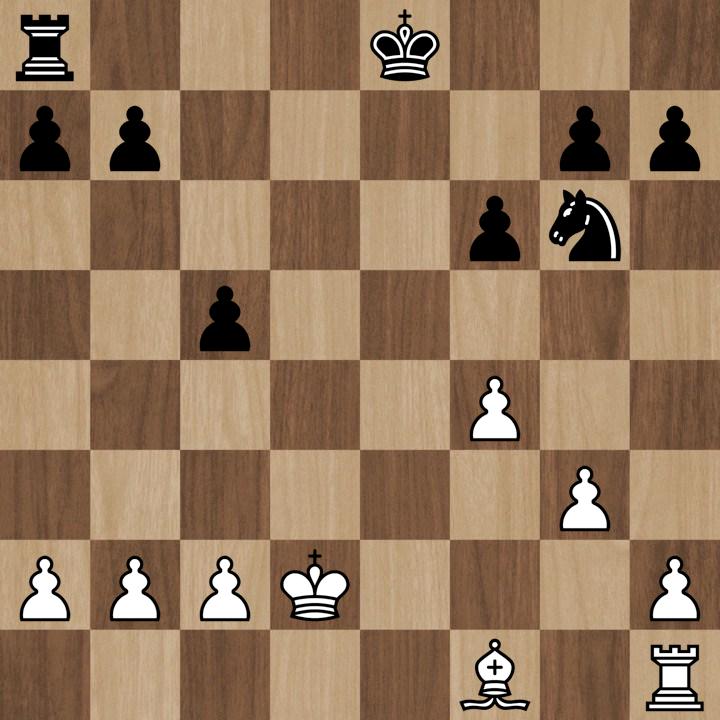
My opponent (2283) had played the slightly dubious 3. ...Nxe4-Petroff and I reached a clearly better endgame. Here though, I went wrong.
I played the natural-looking 20.Bg2?!, but after 20. ...Rd8+ 21.Kc3 b6, Black's position was manageable. Instead, I should've went for 20.Kc3 Rd8 21.Bd3!, after which the plan of invading with Kc3-c4-b5 looks hard to stop. For instance, 21. ...Rd4 22.Re1+ Kd8 23.Re4! and White is clearly better, as Black cannot trade rooks (23. ...Rxe4 24.Bxe4 Kc7 25.Kc4 +-).
In the game, the advantage swindled and a draw was agreed eventually.
A GM-norm was now out of the question, but a good tournament definitely not.
(8)
If I had won the previous game and still had chances for a GM norm, I would've played something more enterprising with Black against Berczes (2427), but this way, I was happy to play a solid game.
My opponent played a bit of a dry variation in the London System and offered a draw quite quickly, which I accepted.
This one was the only 'boring' game of the tournament, where I don't have anything better to show than the final position:
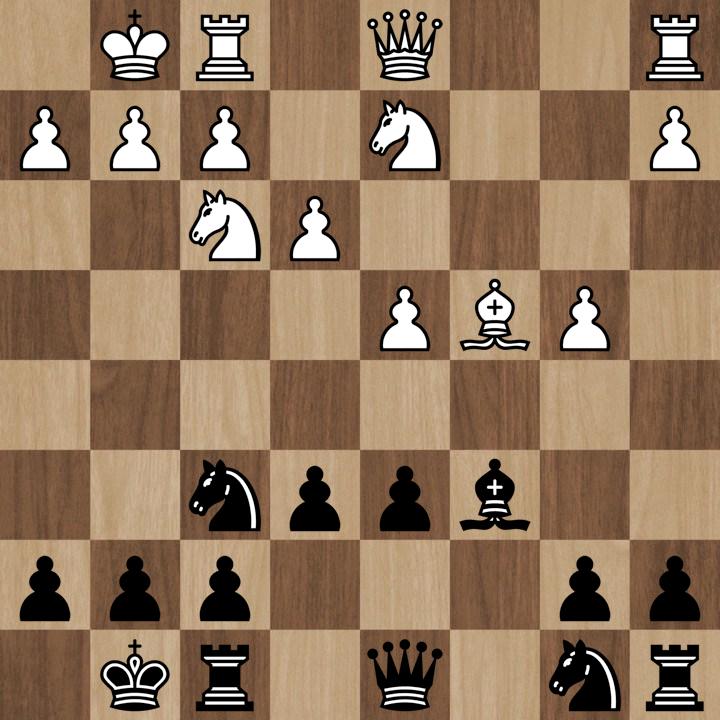
(9)
In the final round, I was playing a young talent from India, who at only 12 years of age had already achieved an impressive rating of 2325. He was struggling a bit toward the end of the tournament though so I wanted to try and win a third game and end the tournament on a high note.
And it turned out to be one more clean win, as I got a clear advantage from the opening and capitalised on some mistakes later more or less efficiently.
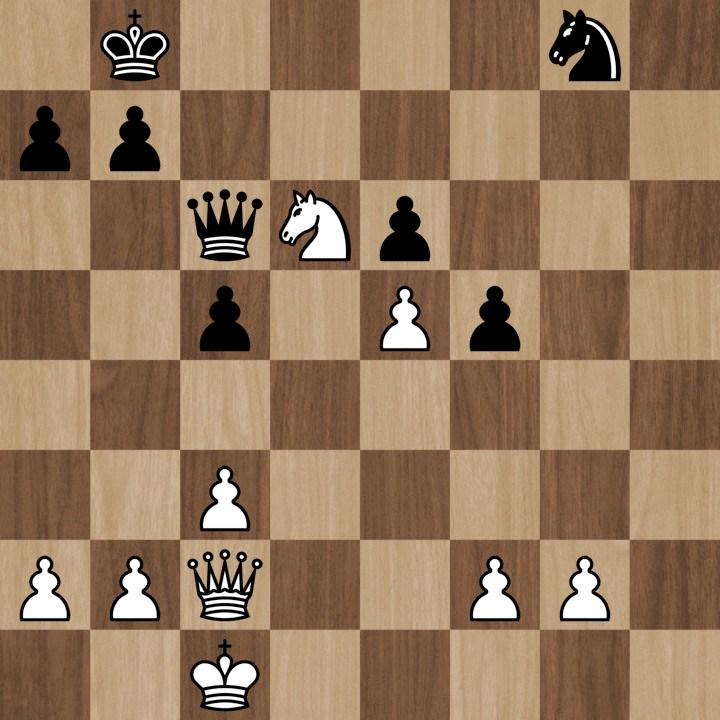
Here, 26.Qb3! secured a winning advantage, as after 26. ...Qd7 27.Nxf5 White wins a second pawn. From here, the conversion was not too difficult.
26. ...Qxg2 27.Qxe6 would not have helped, as Black doesn't have enough counterplay, there is no perpetual check in sight.
Approaching the goal!
The month of March has been very fruitful w.r.t. the goal I defined in this challenge -- reaching 2500.
In total, I won 22 rating points in 20 rated classical games:
- 9 games in the Bad Wörishofen Open, 6,5/9: +4.9
- 2 games in the 2. Bundesliga, 1,5/2: +4.5
- 9 games in the GM tournament this post was all about: +12.4
After a couple of years of no real progress, it is nice to see that finally there is some movement in the right direction.
At 2429, I'm on a new personal all-time-high, so I'm excited to continue trying for 2500.
As mentioned earlier though, I'll play more tournaments only in the summer after a couple of months of little to no competitive chess.
In the meantime, I intend to train regularly to try and make another surge in a couple of months.
In the following weeks and months, therefore, this blog will be about training again.
Instead of the initially intended weekly post, I'll reduce this to one entry every three weeks. My main goal for these coming months is to become a better calculator, as I feel like this area is mainly what separates me from stronger chess players (such as grandmasters).
I'll be back with another blog entry in a couple of weeks, where I'll start this next chapter of this series: a prolonged period of training only.
Thanks so much for reading. Cheers!
More blog posts by iakov98

Challenge 2500 | Almost halfway there!
After Vlissingen, I competed in two more tournaments in August. In this brief article I summarise th…
Challenge 2500 | 11. Vlissingen
Tournament play continues! Reviewing my tournament result in Vlissingen; one more step forward on my…
Challenge 2500 | 10. Training Continues
In this post, I'll recap how this project has been going so far, set some goals and intentions for t…